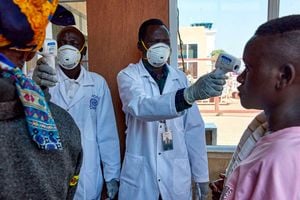World leaders urged to use Covid lessons to prepare for future

Delegates during a session of the United Nations General Assembly at United Nations headquarters in New York City on September 19, 2023.
If lessons are learned, the next pandemic can have less tragic effects, speakers at the ongoing United Nations General Assembly meeting in New York said while urging world leaders to invest in the people’s health.
The speakers added that it’s unacceptable for people’s survival to depend on their location.
As nations across the planet painfully learned, no country was immune to the deadly, fast-spreading coronavirus, which pushed healthcare systems to their limits, killed millions and set back development gains by decades.
World leaders are expected to adopt a political declaration at a high-level meeting tomorrow on universal health coverage (UHC), pandemic preparedness, prevention and response and tuberculosis (TB) to mobilise political and financial resources to promote health systems resilience.
Through the pandemic accord, governments are looking for ways to shore up funding and address the inequalities that were experienced during the Covid-19 crisis. The accord will drive access to diagnostics, vaccines and treatments and end the exclusion of marginalised communities from engagement in designing their welfare.
Ms Helen Clark, the former co-chair of the Independent Panel for Pandemic Preparedness and Response, said the virus visited a great cost to people and governments.
“The question is, how urgently can we get prepared and bring the transformation which the international system for pandemic preparedness and response requires? Viruses with pandemic potential won’t wait for years for diplomacy to produce results before they strike,” she said.
She added that it is unfortunate that during the pandemic, there were inequalities and the world treated countries and communities depending on where they were and the section of the world, they lived in.
“A new pandemic accord can commit countries to strengthen national health systems, surveillance, solidarity and equity. This is the world’s next opportunity. Please do not miss it,” Ms Clark said.
She added: “There has to be a pre-negotiated and financed end-to-end ecosystem for medical countermeasures. Every region must have the technology, knowledge and local capacity needed to stop outbreaks when and where they occur. Other essential supplies to safeguard human life must also be accessible. No country should be at the mercy of global markets to protect its citizens.”
According to Ms Clark, the demand for grants from the new pandemic fund is vastly outstripping what is available, necessitating a global public investment model “to support low- and middle-income countries”.
“I am confident that human ingenuity and solidarity can make Covid-19 the last pandemic of such devastation. But that is a political choice. You have the power to make it,” Ms Clark told world leaders.
The World Bank announced at the meeting that the world needs about $10 billion annually to effectively prepare for future pandemics yet only $2 billion has been raised in seed capital from 25 sovereign and philanthropic contributors.
The Pandemic Fund’s governing board has since approved grants to 37 countries across six regions under its first round of funding allocations aimed at boosting resilience to future pandemics.
Established in September last year, the fund is the first multilateral financing mechanism dedicated to providing multi-year grants to help low- and middle-income countries to help them better prepare for future pandemics.
About 30 per cent of the grants allocated are for projects in sub-Sahara Africa, the region with the highest demand for Pandemic Fund grants.
“We are very pleased that the Pandemic Fund has been able to move forward so quickly to allocate funding to projects that represent a good balance across geographical regions, country income groups, and participating implementing entities,” said board chair Dr Sabin Nsanzimana, Rwanda’s Minister for Health .





